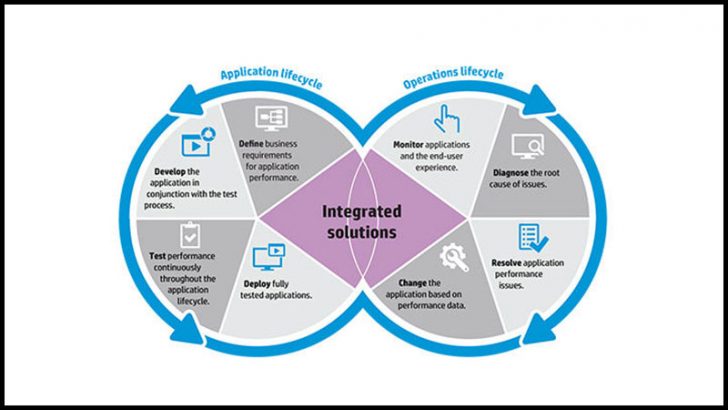
While testing and application performance are not the most exciting subjects in the world of IT they are critical to the ability of IT to meet the demands of the business. HP PES has been created by taking a number of assets from two of HP’s developer portfolios, HP Applications Delivery Management (ADM) and HP Application Performance Monitoring (APM).
The goal is to provide both developers and operations teams a single product suite that will fit in with their new DevOps strategy. Developers will gain from the ability to do continuous feedback and testing while operations teams will get new monitoring tools that will enable them to identify what is causing applications to under perform.
The use of continuous processes as part of an Agile methodology has been underway in many organisations for over a decade. The key challenge has always been the move from development to production. The biggest issue between developers and operations teams has always been how testing is carried out and how to determine if an application is ready for production workloads.
According to UK analyst firm Creative Intellect Consulting: “This has caused an application backlog where applications are waiting to be accepted into production. The impact of this is not just felt in IT departments it adds to the user perception that getting internal applications built is far slower than going to cloud applications and services. In effective it is driving business units to bypass IT with serious consequences such as shadow IT and a loss of control of data which causes governance and compliance risk.”
PES has strong application performance tooling
The press release highlights three capabilities that the HP Performance Engineering Solution will deliver:
- Performance Application Lifecycle (PAL): provides an integrated methodology designed to break down the silos between the development, quality assurance, and IT operations teams. These teams can use HP AppPulse Mobile, a mobile app monitoring tool, which is now integrated with HP Mobile Center, to leverage real-user data directly in the testing process, resulting in increased testing efficiencies, improved performance, and greater stability for mobile apps. Additionally, app owners and developers can use HP AppPulse Active, a synthetic monitoring tool, which is now integrated with HP Mobile Center, to capture performance and availability issues before and after releasing into production.
- Support for Docker: simplifies the deployment of application testing in a hybrid infrastructure by providing support for Docker. Performance Engineers can use the Linux-based HP LoadRunner Load Generators to drive application testing in a fast and inexpensive manner, without sacrificing functionality or security.
- Network Virtualization (NV) Freemium: delivers a free on-demand service that provides customers with a personalized report that analyzes the performance of their applications under different network conditions without the need to commit to any physical infrastructure. NV Freemium also provides customized recommendations on how an app can be designed differently to achieve a better performance rating from end users. These application insights allow for tighter collaboration between the dev and test teams which lead to faster and higher quality production cycles.

In a canned quote from the press release Raffi Margaliot, Senior Vice President & General Manager, Application Delivery Management, HP Software said: “To succeed in the idea economy, businesses need to deliver quality, high performance applications at high velocity. HP is delivering a breakthrough solution that brings together vital aspects of the DevOps process, enabling developers and IT professionals to work together to rapidly deliver applications that help them gain market share, reduce costs, and positively impact revenue.”
There are several things here that are interesting. The first is the grouping of tools under PAL. It contains tools that would previously been part of operations monitoring and application lifecycle management. This helps reinforce the message that PES is designed to support DevOps processes.
The second is the lack of pricing information. HP has been criticised in the past for the cost of tools such as Network Virtualisation (NV) and the lack of a low cost cloud-based testing solution for mobile app developers. It has begun to address the latter and the creation of a NV Freemium solution suggests that it is addressing the former. This raises two questions such as how much will developers get under the NV Freemium solution and what will the cost be to extend the solution?
The third area of interest and it is significant is support for testing applications inside Docker containers. This should speed up the process of delivering applications into containers by enabling developers to use a Docker container as their delivery target for their application. This can then be passed to the test team for verification and then go direct into deployment. This removes the confusion inside some enterprise IT teams as to whether it is down to development teams or operations teams to put applications into a Docker container.
Conclusion
This is an interesting announcement from HP and one that will be welcomed by a lot of DevOps teams who are struggling to get the best out of DevOps and their continuous processes. Pricing will be key and if HP want to take back market share that it has been losing in the testing market, it will need to make the pricing aggressive.


























